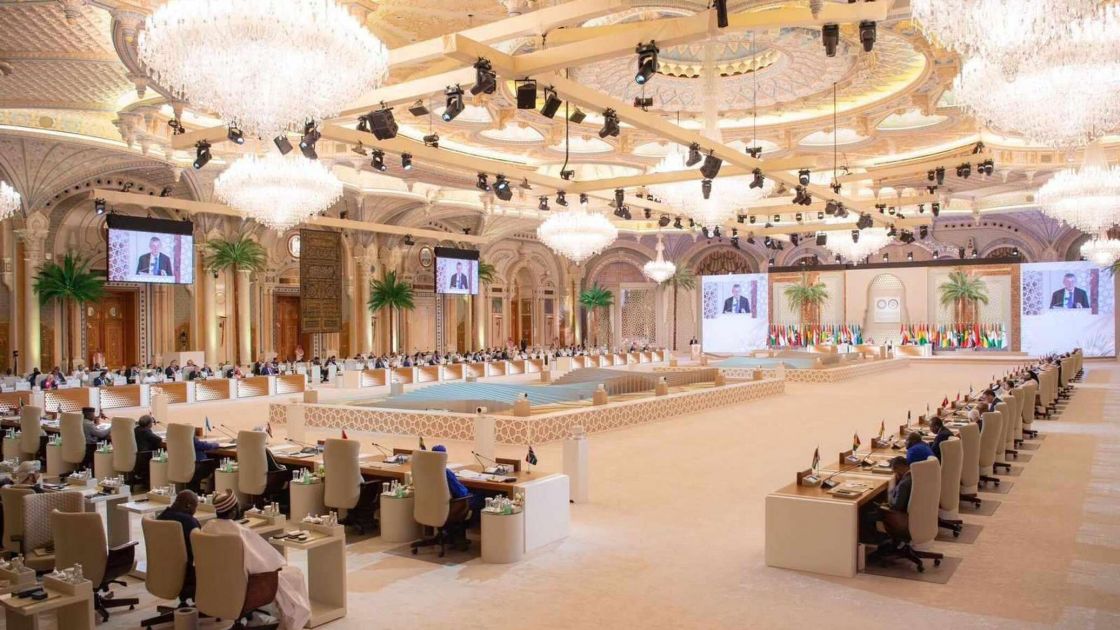- Editorials
- Posted
Kassioun Editorial 1148: Two Outcomes to the Arab-Islamic Summit
An extraordinary joint Arab-OIC summit was held in Riyadh, Saudi Arabia on Saturday November 11, 2023, under the title “Discussing the Israeli aggression against the Palestinian people”. The summit concluded with issuing a final statement that included 31 items, most of which focused on “denuncing and condemning”, without any accompanying concrete actions, except within narrow limits.
If one wants to be fair towards the outcome of this summit, one cannot say that the final statement is a “bad statement”. The statement focuses on demanding and pressuring for an immediate ceasefire and for aid delivery. It also condemns the Zionist entity’s practices and demands that it be placed before international justice, etc. These are rightful and necessary demands, but they are certainly not sufficient.
That is, although the final statement is not bad, it is still far from being good, and it lacks many things for it to rise to the level of the current historical moment, and to the aspirations and desires of the peoples of Arab and Islamic countries, and the aspirations of peoples across the world who demonstrated and are demonstrating in support of Palestine and the Palestinian people, and rejection of Zionist criminality.
The bare minimum that was required of this Arab-Islamic summit was to impose the process of opening the Rafah crossing to aid; it was unable to do so and did not even suggest such a possibility.
It suffices to look at some of the proposals said to have been proposed but were not passed within this summit. (It is worth noting that there are no clear confirmations from official sides on this point yet). However, it is sufficient to look at these supposed proposals to clarify some of what is missing in this statement that would have made it good, and what this summit lacks to rise to the level of the moment. There are in particular four proposals:
1- Preventing US bases on their territories (i.e., of the signatory countries) from supplying “Israel” with weapons and ammunition.
2- Freezing diplomatic, economic, security, and military relations with “Israel”.
3- Threatening to use oil and other economic sanctions.
4- Denying “Israeli” civil aviation from passing through their airspaces.
Equally important, and perhaps more important, is directly holding the US fully responsible for the Zionist aggression, not only as a sponsor of the Zionist entity, but also as the maker of its decisions in war and peace. Implicitly, this summit should have declared that the US has lost once and for all any possibility of playing the role of “mediator” in resolving the Palestinian issue.
In any case, we believe that the two main outcomes of this summit are the following:
First: The summit is an indication of the attempts of many regimes within the countries of the Global South to adapt to the new global realities in which the West is no longer the master of the global map and controller of its directions. Therefore, in general, we have heard a level of speech that is relatively higher than before, and at the level of specific countries we have heard discourse that is noticeably higher than their previous discourse.
Second: Nevertheless, this summit itself is an indication of how far behind the regimes are from the peoples’ movement and demands. The adaptation attempts undertaken by most regimes are slow and hesitant, not to mention late and insufficient.
In general, it was not Palestine and the Palestinian issue that were being under test within the summit, but rather the regimes participating therein. The door to change at the regional and global levels, which the Al-Aqsa Flood contributed to opening, cannot be closed with a statement here or a statement there.


